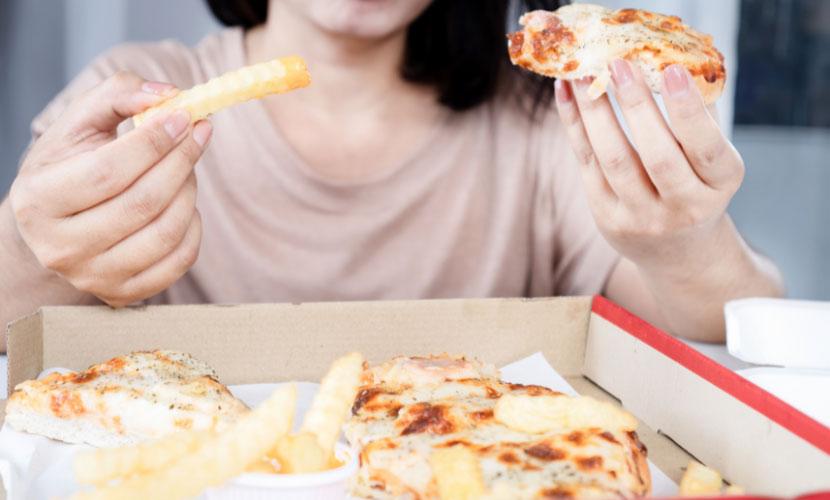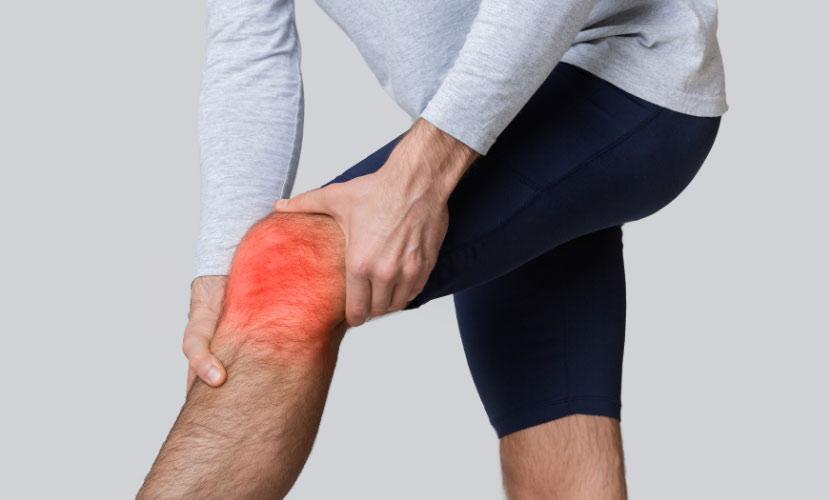🏆 As seen and loved on Shark Tank Dubai 🏆

Anti-Bloating Meal Plan
Post-Workout Bloating – Precautions and Meal Plans
In the health-conscious era of today, working out in gyms is a major fad. People have different health goals, and therefore, each person's workout is different. Some people exercise to gain muscles, while others want to lose weight. Some are into athletics, while some are just fitness and health freaks. But a common experience for everyone after their respective workout is the problem of bloating. Are you, too, an athlete and want to know what to eat post-workout? The athlete's diet plan from our dieticians is the best option.
Bloating is when lots of air and gas accumulate in the digestive tract. It makes a person feel full and gives a tight or swollen abdomen. Bloating occurs mainly due to swallowing large quantities of air while eating, drinking, smoking, chewing gums, or exercising. In addition, abdominal pain, flatulence, burping, and abdominal roars happen when you are bloated. It hinders work and other social and recreational activities.
It is often confused with water retention. Bloating happens when lots of solid, liquid, and gas fills in your digestive tract. On the other hand, water retention occurs when your intake of sugars and salts is excessive. People with bloating have sensitive abdominal health. It is due to dietary patterns and sometimes due to medical conditions too.
Dietary habits
Don't binge-eat

Binge-eating is one of the reasons to feel bloated. Exercising on a full stomach disorients the body, and then it focuses more on the muscles than digestion. Hence, food will take lots of time to digest. This will make you puffy after your session. So, always maintain a gap of at least two hours between your meals and your workouts.
Overhydration
Drinking lots of water during and after a workout fills the tummy with excessive water and dilutes the sodium. On the other hand, sweating reduces the water balance, and we again drink water. Thus, the body's cells fill with water, making us feel bloated.
Dehydration
Bloating is the water retention of the body to the lack of water. Thus, keeping the water level optimal is crucial to reducing bloating and its ill effects. The optimal hydration level before the workout reduces the chances of bloating later.
Try a Low-FODMAP Diet
FODMAP's are indigestible carbohydrates. These include wheat, onions, garlic, cabbage, cauliflower, artichokes, beans, apples, pears, and watermelon. FODMAPs are one of the biggest reasons for irritable bowel syndrome (IBS). Patients with IBS complain of bloating, constipation, diarrhea, stomach pain, and discomfort. So, if you are suffering from either of these diseases, remember to avoid them as pre or post-workout food items.
Incorporate Probiotics
Probiotics on an empty stomach are widely known to strengthen gut health and boost immunity. Our digestive tract has many gas-producing bacteria that are a reason for bloating most of the time. So, having probiotics reduces the amount of gas those bacteria produce and helps relieve the pains and discomfort. Probiotics take time to work, and their pace depends on your body's framework.
Precautions to take
Eliminate food allergies and intolerances

Certain food allergies and intolerances are also responsible for bloating. Lactose and fructose intolerance, egg and gluten/wheat allergy, etc., all constitute bloating issues. We offer a dairy and gluten-free meal plan in Dubai and all over the UAE for people with such intolerances at affordable rates.
Avoid swallowing too much air
We breathe heavily and inhale more oxygen than required during a workout. In the process, some of this oxygen passes through the esophagus, goes down to our stomach and intestine, and ends up in the colons, making us feel overblown. This generally happens during running. On top of that, consuming carbonated drinks like soda or cold fizz too produces gas and carbon dioxide in the stomach. Other reasons include swallowing gas, talking while eating, and eating in a hurry.
Avoid gas-producing foods
Many foods like certain vegetables, legumes, and beans are gas-producing. Fibre-rich and protein-rich foods that help us stay fuller longer are recipes for disaster if taken before a workout. Keeping a diet journal will help you know which foods produce more gas and bloating in your body.
Be aware of sugar alcohols
Sugar alcohols are present in sugar-free foods and chewing gums that give a sweet taste. They are a good substitute for sugar but produce lots of gas when digested by the large intestines. Sugar alcohols are also among FODMAP foods.
Take digestive enzyme supplements
The intake of supplements to reduce bloating is a quick and easy solution. For instance, lactase is an enzyme that breaks down lactose and is helpful for people who are lactose intolerant. Moreover, beano is a supplement containing the alpha-galactosidase enzyme, which breaks down FODMAPs from many foods.
Anti-bloating meal plan options
Our competent chefs have designed anti-bloating Food plan Dubai to help you feel lighter and more comfortable.
Breakfast
Start your day off right with a nutritious and anti-bloating breakfast. These morning meal ideas will help you kickstart your digestion and prevent bloating throughout the day.
- Egg scramble: It is prepared with grilled salmon or veggies, some chopped asparagus, one teaspoon of dried basil, and a cup of green tea.
- Two hard-boiled eggs: This breakfast includes a cup of dandelion root tea, steamed spinach/stir-fried/boiled spinach, and tomatoes.
- Watermelon cucumber smoothie: It is served with a cup of dandelion root tea.
- 1/3 cup of oats: It is prepared with unsweetened almond milk, one tablespoon of peanut butter, some cinnamon, and a cup of green tea.
Lunch
Consider incorporating these nourishing and digestion-friendly lunch options for a bloat-free and satisfying midday meal.
- Spinach salad with lemon herb chicken: We prepare the chicken dressing with raspberry or orange vinegar, one teaspoon of olive oil, and one tablespoon of chopped pecans.
- Chopped romaine salad: This is prepared with cucumbers, carrots, steamed shrimp, avocado, and balsamic vinegar.
- Tuna salad: This salad has 1 cup of romaine lettuce, 1/2 cup of artichoke hearts, one plum tomato, 4 to 6 ounces of canned tuna in olive oil over a bed of greens. Our health experts can prepare them for you in the most personalized form.
- Greek yoghurt with marinated chicken: This tastes best with a salad of 1/3 avocado, tomato, and cucumber.
Dinner
Finish your day with a delicious and anti-bloating dinner that will keep you feeling light and comfortable. These dinner options are designed to support healthy digestion and minimize bloating.
- Cod and sweet potato fries: This includes baked cod, roasted fennel, and romaine lettuce salad, added with carrots, tomatoes, bell peppers, etc., in a dressing of lemon juice. We also offer a vegetarian-friendly diet plan for all veggie lovers.
- Dijon Salmon: We add a tsp of Dijon mustard to salmon, top it with 1 tsp of fresh parsley, and bake it to serve you hot and fresh in microwave-friendly packaging.
- Sweet potato plate: We serve a sweet potato, sautéed spinach, grilled chicken, lemon juice, and a drizzle of olive oil.
Snacks
Stay satiated and beat bloating between meals with these wholesome snack ideas. These snacks are packed with nutrients and are designed to keep your digestion on track throughout the day.
- Gut Healthy smoothie: This is a blend of half a cup of kefir, half a cup of papaya, and ¼ avocado.
- Sliced cucumbers: This we offer with guacamole.
Sliced cucumbers: This we offer with guacamole. Thus, the abovementioned precautions, clubbed with our anti-bloat meal plan, will help you beat the puffiness post-workout as that isn't a deep-rooted condition. A few easy lifestyle modifications and exercise routines can bounce you back to being fit as a fiddle within a few weeks' time.
Summing up
In conclusion, following an anti-bloating meal plan can significantly improve your digestive comfort and reduce bloating. You can promote better digestion and alleviate bloating symptoms by prioritizing hydration, including probiotics, being mindful of FODMAPs, and avoiding carbonated drinks and chewing gum. Listen to your body's unique needs and adjust the meal plan accordingly. These dietary changes allow you to enjoy a more comfortable and bloating-free life.
We cook with the best quality meat, fruits, vegetables, ingredients, spices, and herbs to suit the dietary needs of our patrons. Our prime focus is your health and fitness goals. Therefore, we offer other types of weekly changing meal plans and diet charts too.
Contact us to get your anti-bloat meal plan and say bye to bloating and hello to a healthy gut!
Reach out to start your fitness journey with us!
Meal Plans
Delivery Details
Legal Information
© 2020-2026 VMeals. All rights reserved. VMeals™ is a trademark of Flip Side Restaurant and Cafe L.L.C
We accept
